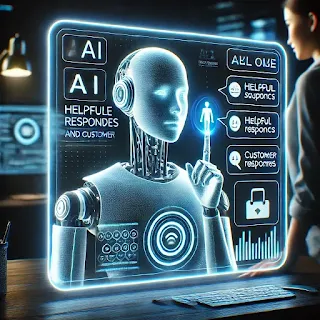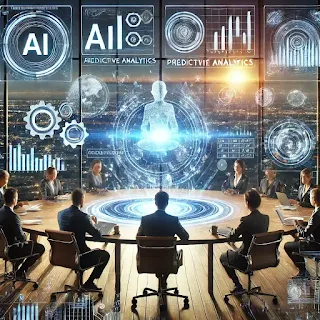The Role of AI in the Future of Business: Transforming Industries and Enhancing Efficiency Introduction
- Get link
- X
- Other Apps
The Role of AI in the Future of Business: Transforming Industries and Enhancing Efficiency
Introduction
Artificial Intelligence (AI) is revolutionizing industries, automating processes, and reshaping the way businesses operate. With advancements in machine learning, natural language processing, and robotics, AI is becoming an integral part of the global economy. This article explores the transformative impact of AI on businesses, its benefits, challenges, and future prospects.
The Growing Importance of AI in Business
AI has become a game-changer across multiple industries, from healthcare to finance, manufacturing, and retail. Companies are leveraging AI-driven solutions to enhance customer experience, optimize operations, and make data-driven decisions.
Key Areas Where AI is Making a Difference
Automation and Efficiency AI-powered automation reduces repetitive tasks, increases productivity, and minimizes human errors. Businesses can streamline workflows, saving time and resources.
Customer Service Enhancement AI chatbots and virtual assistants provide 24/7 support, improving customer satisfaction. Companies like Amazon and Google use AI-driven customer service to enhance user experience.

AI chatbot, customer service automation, AI and customer experience Predictive Analytics AI analyzes vast amounts of data to provide insights that help businesses make informed decisions. For example, financial institutions use AI to predict market trends and prevent fraud.
Personalized Marketing AI-driven algorithms analyze customer behavior and preferences to deliver targeted advertising. Social media platforms use AI to recommend content based on user interests.
Supply Chain Optimization AI enhances logistics and inventory management, reducing costs and improving delivery times. Companies like FedEx and Amazon use AI to optimize delivery routes.
Benefits of AI in Business
1. Cost Reduction
By automating tasks, businesses can significantly cut labor costs and operational expenses. AI-powered tools help companies streamline workflows, reducing inefficiencies and maximizing profits.
2. Improved Decision-Making
AI analyzes data faster and more accurately than humans, allowing businesses to make strategic decisions based on real-time insights. This leads to better financial planning, market predictions, and risk assessments.
3. Enhanced Customer Experience
With AI-powered recommendation systems, businesses can offer personalized experiences to customers. E-commerce platforms like Amazon and Netflix use AI to suggest products and content tailored to user preferences.
4. Competitive Advantage
Companies that adopt AI gain a significant competitive edge by leveraging data-driven strategies, optimizing processes, and delivering superior customer service.
Challenges and Ethical Concerns
While AI offers numerous benefits, businesses must also address its challenges:
Job Displacement Automation may replace certain jobs, requiring workers to upskill or reskill. Governments and businesses must work together to create AI-focused training programs.
Data Privacy Issues AI relies on vast amounts of data, raising concerns about data security and user privacy. Companies need to ensure compliance with data protection laws.
Bias and Fairness AI models can inherit biases from training data, leading to unfair outcomes. Transparency and ethical AI practices are crucial to mitigate this issue.
Implementation Costs Developing and integrating AI solutions can be expensive for small businesses. However, cloud-based AI services offer more affordable options.
The Future of AI in Business
The future of AI is promising, with continuous advancements in deep learning, robotics, and quantum computing. Businesses must stay ahead by investing in AI technologies, fostering innovation, and ensuring ethical AI deployment.
Trends to Watch
AI-powered Virtual Assistants: More businesses will integrate AI assistants for customer support.
AI in Cybersecurity: AI will play a crucial role in detecting and preventing cyber threats.
Hyper-Personalization: AI will refine marketing strategies by delivering highly personalized content.
AI and the Metaverse: AI will drive virtual environments, enhancing digital experiences.
 |
| AI future, business innovation, AI-powered strategies |
Conclusion
AI is no longer a futuristic concept; it is actively transforming businesses today. Companies that embrace AI will thrive in the competitive landscape, while those that lag behind risk obsolescence. By addressing challenges and implementing AI responsibly, businesses can unlock its full potential and drive innovation.
Sources:
McKinsey & Company: "The Future of AI in Business"
Harvard Business Review: "AI and Business Strategy"
Forbes: "How AI is Transforming Industries"
MIT Technology Review: "The Ethical Implications of AI"
- Get link
- X
- Other Apps





Comments
Post a Comment